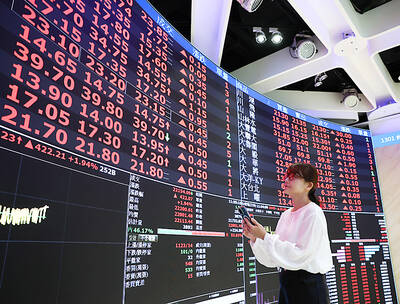Facebook Inc CEO Mark Zuckerberg last week called Australian lawmakers to discuss rules that would make Internet giants pay news outlets for content, but failed to persuade them to change policy, the country’s treasurer said yesterday.
Zuckerberg “reached out to talk about the code and the impact on Facebook” and a constructive discussion followed among the social media billionaire, Australian Treasurer Josh Frydenberg and Australian Minister for Communications Paul Fletcher.
“No, Mark Zuckerberg didn’t convince me to back down if that’s what you’re asking,” Frydenberg told the Australian Broadcasting Corp (ABC), without giving further details of the meeting.

Photo: AFP
A Facebook spokeswoman in Australia said the company’s executives regularly meet with government stakeholders on a range of topics.
Australia intends to introduce a law that would force Facebook, the world’s largest social media platform, and Internet search giant Google Inc to negotiate payments to media companies whose content drives traffic to their Web site. If the parties cannot agree on payments, a government-appointed arbitrator would set the fees for them.
Facebook and Google oppose the “news media bargaining code” and have mounted public campaigns against it. Google has threatened to withdraw its search engine from Australia, while Facebook has warned it would stop Australians sharing news content on its site if the laws go ahead.
At a Senate inquiry into the planned law last month, local heads of both companies outlined their opposition to the plans, which would be among the toughest in the world in dealing with the financial impact of global Internet companies on domestic media, which have been hit by shrinking advertising revenue.
“We’re told that if we go ahead with this, we’re going to break the Internet,” Frydenberg said on ABC.
“What I do know is that media businesses should be paid for content,” he added.

UNCERTAINTIES: Exports surged 34.1% and private investment grew 7.03% to outpace expectations in the first half, although US tariffs could stall momentum The Chung-Hua Institution for Economic Research (CIER, 中華經濟研究院) yesterday raised its GDP growth forecast to 3.05 percent this year on a robust first-half performance, but warned that US tariff threats and external uncertainty could stall momentum in the second half of the year. “The first half proved exceptionally strong, allowing room for optimism,” CIER president Lien Hsien-ming (連賢明) said. “But the growth momentum may slow moving forward due to US tariffs.” The tariff threat poses definite downside risks, although the scale of the impact remains unclear given the unpredictability of US President Donald Trump’s policies, Lien said. Despite the headwinds, Taiwan is likely

READY TO BUY: Shortly after Nvidia announced the approval, Chinese firms scrambled to order the H20 GPUs, which the company must send to the US government for approval Nvidia Corp chief executive officer Jensen Huang (黃仁勳) late on Monday said the technology giant has won approval from US President Donald Trump’s administration to sell its advanced H20 graphics processing units (GPUs) used to develop artificial intelligence (AI) to China. The news came in a company blog post late on Monday and Huang also spoke about the coup on China’s state-run China Global Television Network in remarks shown on X. “The US government has assured Nvidia that licenses will be granted, and Nvidia hopes to start deliveries soon,” the post said. “Today, I’m announcing that the US government has approved for us

When Lika Megreladze was a child, life in her native western Georgian region of Guria revolved around tea. Her mother worked for decades as a scientist at the Soviet Union’s Institute of Tea and Subtropical Crops in the village of Anaseuli, Georgia, perfecting cultivation methods for a Georgian tea industry that supplied the bulk of the vast communist state’s brews. “When I was a child, this was only my mum’s workplace. Only later I realized that it was something big,” she said. Now, the institute lies abandoned. Yellowed papers are strewn around its decaying corridors, and a statue of Soviet founder Vladimir Lenin

The National Stabilization Fund (NSF, 國安基金) is to continue supporting local shares, as uncertainties in international politics and the economy could affect Taiwanese industries’ global deployment and corporate profits, as well as affect stock movement and investor confidence, the Ministry of Finance said in a statement yesterday. The NT$500 billion (US$17.1 billion) fund would remain active in the stock market as the US’ tariff measures have not yet been fully finalized, which would drive international capital flows and global supply chain restructuring, the ministry said after the a meeting of the fund’s steering committee. Along with ongoing geopolitical risks and an unfavorable